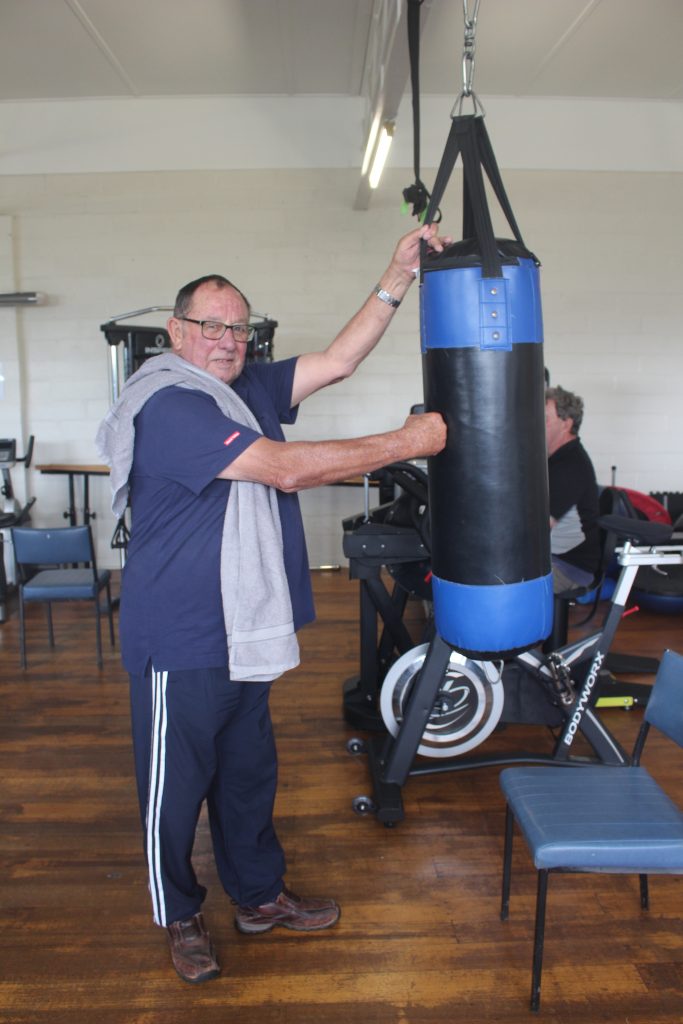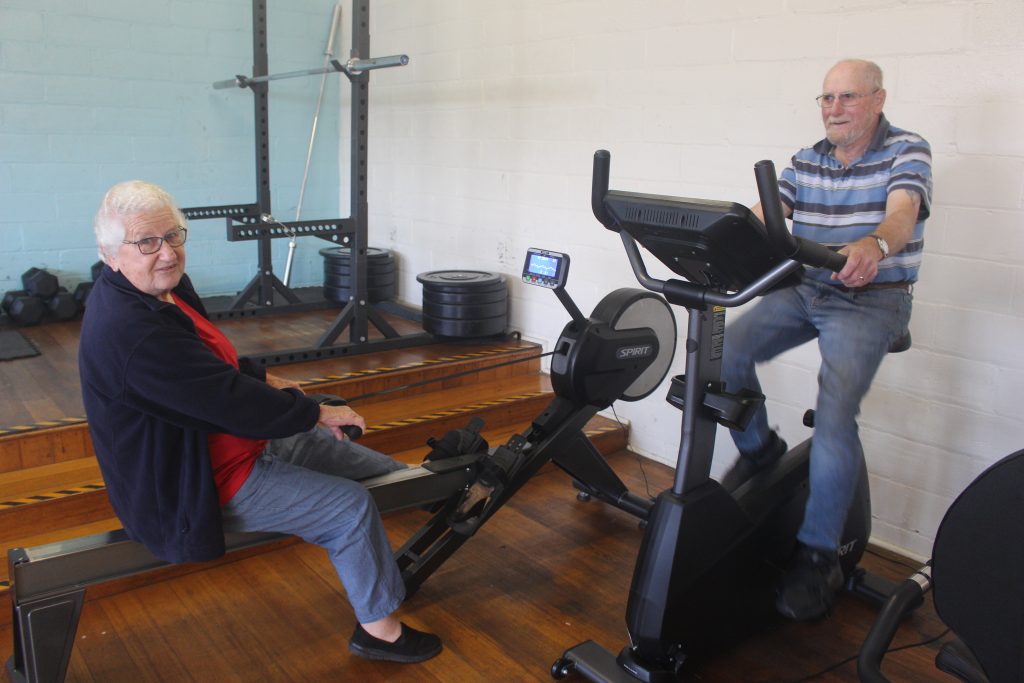Connecting through movement
Posted on August 8, 2024

How exercise can improve chronic conditions and help shape social and emotional wellbeing
Having a heart attack on the remote island of Flinders Island in Tasmania’s Bass Strait would be a huge wake-up call to anyone.
But would it be enough to get you to the gym twice a week, in your seventies?
Most of us know how important regular exercise is for our health, and how beneficial it might be to go to the gym regularly. And yet for many, it’s a struggle to maintain a constant routine.
A group of septuagenarians on Flinders Island seem to have found that missing link. Their secret? Share a yarn, a laugh, and maybe the odd bit of cake.
The shock of a health event or diagnosis might have been what got them into the gym initially, but it’s the camaraderie that has keeps them coming back.
The setting for all this action is the Flinders Council’s community gym in Whitemark. The gym is used for a range of individual and group exercise activities, including David Heap’s twice-weekly exercise class.
The class is run by the Royal Flying Doctor Service Tasmania and funded by the Australian Government through Primary Health Tasmania. It’s part of a program focused on supporting people living with certain chronic health conditions in rural areas.
David Heap is a physiotherapist who works as a physical health worker with the Royal Flying Doctor Service.
He designs individual routines specifically for the chronic conditions that led his clients to the gym.
While the program aims to help people with chronic conditions better manage their health, another positive effect has been strengthening social ties and improving mood.
The class participants share the knowledge they’ve gained on the program, while sharing a laugh and motivating each other.
On a chilly and blustery Flinders Island morning, Beatles tunes are blaring and laughter rings through the gym.
You wouldn’t think some of these older people have had serious health problems, including multiple heart attacks. But the exercise program is giving them a new lease on life.
David’s passion and connection to the community is palpable, and he has been there since the program’s inception in 2017.
“At the start there were three or four cardiac patients like Jacko and I would have just seen them in a physio room, which doesn’t really work,” he says.
David now has around 10 people enrolled in his class at any one time.
He explains the importance of this program to the heart of a rural community.
“When someone from the island has to go away for major heart surgery, they can come home to this program,” David says.
“So they get to come home sooner, rather than having to stay in Melbourne for a month to do cardiac rehab. And they’re so appreciative of this.
“It’s really important for people who don’t want to be off the island, who want to be with family. That’s going to help their recovery.”
Andrew Jackson, fondly known to the group as Jacko, credits the exercise class with keeping him alive after heart surgery.
“I’ve had five bypasses. I didn’t have a heart attack, but I was feeling very tired,” Jacko says.
“When the operation was over, David got hold of me and said ‘you want to stay alive Jackson? Be in the gym on Friday morning’. Bingo.
“All of these guys, we all started together. And I wouldn’t be without it.
“The conversation and the jokes and the music, it’s psychological as well as physical.
“In fact, I’d say that’s more important than actually doing this stuff (exercises). That’s what gets you out of bed in the middle of winter on Flinders Island.”
At 88, John Langdon is the oldest gym buff in the class, and has an exercise regime better than many people half his age.
“I’ve had a pacemaker and a knee and all that sort of stuff done, and David’s been terrific,” he says.
“Now I ride a bike for about 25 to 30 kilometres nearly every day. A combination of this class twice a week and riding keeps me going.
“Socially too, it’s terrific. Everybody knows one another. We all have a bit of a joke, and we all look after one another. We’re very appreciative.”
Gerard Dilger started the class after he had a kidney transplant.
“I had to live in Launceston before, on dialysis machine for two years, waiting for a transplant. So it’s good to be home,” Gerard says.
“The kidney is going really good, 100%.
“I’m born and bred on the island. It’s pretty good over here, we’re very lucky actually.
“It’s really good”.
Anne Campbell, another exercise class participant in her seventies, says coming to the gym is a vital part of her week.
“I think it’s great for us senior people to have somewhere to go because if you don’t use it, you lose it,” she says. “And you can have fun doing it.”
These islanders seem to have cracked the code on how to stay motivated go to the gym. And the solution might just be social connection.
In an increasingly disconnected world, any opportunity for social connection is priceless. It can stave off loneliness and improve our quality of life and health outcomes. Combining it with exercise? Well, that might just be the secret to a long and happy life.
Improving the health of rural Tasmanians
Primary Health Tasmania has commissioned four organisations to provide a range of free services to support people with chronic health conditions living in rural parts of Tasmania.
Funded by the Australian Government, the services are available in 21 of the state’s 29 local government areas.
The organisations are:
- Royal Flying Doctor Service Tasmania – supporting people with specific conditions in rural areas of northern and southern Tasmania
- Rural Health Tasmania – supporting people with certain conditions in rural areas of north-west, and western Tasmania
- Corumbene Care – supporting people with certain conditions in rural areas of southern Tasmania
- Diabetes Tasmania – providing diabetes education and support services to people with type 2 diabetes in all 21 rural local government areas.
No referral is required.
Want to know more? Go to tasp.hn/ruralhealthservices
This story features in Issue 18 of our Primary Health Matters magazine. Click here to read the rest of the issue.

